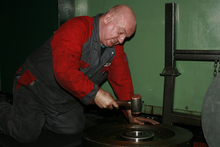A Simple Scenario
The following scenario describes a kind of problem that should be familiar to anyone working in maintenance. It illustrates exactly how a CMMS can save you time, effort, and resources.
- Suppose the maintenance department gets a call that goes through to voice mail: "There's a light out in the lobby."
- Worker A is dispatched to deal with the problem. He takes a ladder and the company's standard fluorescent light bulb. However, when he gets to the lobby, he sees that the problem isn't one of the company's usual lights; it's a light high up in the lobby ceiling. He tries his ladder, but finds that the ceiling is higher than expected. He can't reach the bulb.
- Worker A goes to a storeroom for a higher ladder. When he gets back to the lobby and climbs the ladder, he finds that the light needs some fancy kind of bulb. Unfortunately, he's only got the standard bulb with him.
- Worker A goes back to the storeroom and looks for the right kind of bulb. There isn't one. He has to order one...but he finds the bulbs only come in packages of four.
- Several days later, the bulbs are delivered. Worker A replaces the burned-out bulb and puts the other three someplace "special" so they'll be available the next time the lobby bulb burns out.
-
Time passes and the bulb burns out again.
Worker A might well remember that changing the light requires a special bulb
and an extra-high ladder. He might even remember where he put the bulbs
from before. But what if Worker A is busy on other work?
What if Worker A has left the company altogether?
- Worker B is dispatched to change the bulb.
- He gets to the lobby and finds his ladder is too short.
- He gets a bigger ladder and finds he needs a special bulb.
- He can't find the bulbs that Worker A bought, so he orders another package of four.
- Several days pass until the bulbs arrive. Worker B has another three extra bulbs which he puts someplace "special"...
Now how does a good CMMS help in this situation? After Worker A finishes the job the first time, the worker (or a secretary or a supervisor) can use the CMMS to record, "When someone reports a light out in the lobby, call ahead to ask which light it is. If it's the one high up in the ceiling, you'll need an extra-long ladder and special bulb XYZ. There are now 3 XYZ bulbs in Storeroom 1 on Shelf 234."
When Worker B is sent to change the bulb, he gets a work order that contains this information. Therefore, he doesn't have to make three trips to do the work, and your maintenance department doesn't end up with a bunch of extra light bulbs.
- Your workers save time and effort.
- Your maintenance department saves money because workers get the job done faster, and you don't have to buy bulbs you don't need.
- You can use the CMMS to record standard questions to ask anyone reporting a problem. In our scenario, this would be, "Which light is out?" In other situations, you might ask things like, "Is the machine plugged in? Does the electrical outlet actually have power?"
- When you use the last XYZ light bulb, the CMMS lets you know. This lets you order more so that you have some on hand the next time the bulb goes out.
- There are also indirect benefits. It looks bad for your company to be missing a light in the lobby for several days. Potential customers may leave because they think you're closed. A problem that doesn't get fixed for several days makes your company look unprofessional.
There's more. Non-standard light bulbs can be expensive. As time goes on, the price goes up and availability goes down. You might well ask, "Would it be cheaper to change the fixture to a standard bulb rather than stick with what we've got?" A good CMMS helps you quickly determine what you're spending on the current arrangement, so you can decide whether changing the fixture will be more cost-effective.
MainBoss offers an advantage over other CMMS packages: the MainBoss Service Module automatically processes problem reports sent in by email. Instead of phone calls to the maintenance department, someone can report the burnt-out bulb using email. You can even set up web pages that ask the problem-reporter useful questions ("Which light is it?"). From that point on, the service automatically keeps the problem-reporter informed of the job's progress, without maintenance staff having to take any special action.
This service means fewer phone calls, which means your people can work on other things. Automatic feedback means that people who report problems are kept "in the loop", so they're happier with the level of service they receive.




